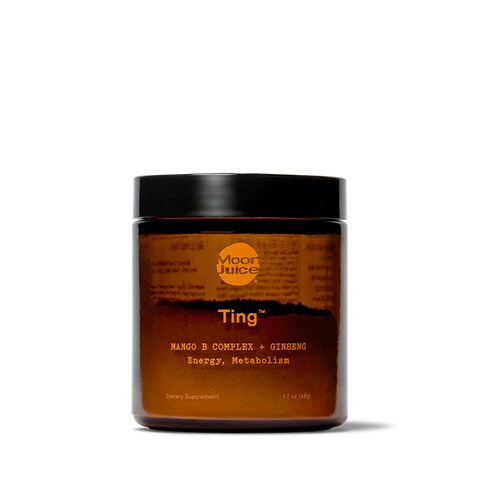When’s the last time you felt truly rested? If you had to stop and think about it, you’re in good company. Although centering rest in our lives is often easier said than done, an improved sleep routine can be one of the most beneficial things we do for our overall health and vitality. Yet most of us, or around 73 percent of Americans, aren’t getting the recommended number of hours (1). And it can be hard to bounce back after even a little lost shut-eye. According to a 2016 study, it takes around four days to recover from just one hour of missed sleep (2).
That’s because critical biological processes take place while we’re sleeping. Our bodies use this downtime to repair cells, release hormones, replenish energy, and reorganize neurons. The brain also uses this time to catalog new information, determining what can be discarded. This is also when our glymphatic (waste-clearing) system is active—clearing out toxic waste while we sleep to flush away unwanted buildup from the day—a function that’s mainly disengaged when we’re awake (3).
Luckily, there are steps you can take to maximize the quality sleep you need at night. Proper sleep hygiene can help you dissolve the tensions of the day so you can wake up feeling refreshed and replenished. From daytime measures to nighttime rituals, here’s a before-bed routine to follow for your dreamiest night’s sleep.
18 Steps to Better Sleep
During the day:
Get sunshine first thing
Healthy sleeping habits start early in your day, with a boost of vitamin D to your circadian rhythm (4). Your sleep-wake cycle is affected by a number of factors, including exposure to light and dark. In fact, a 2014 study found that the more natural light office workers received, the better sleep they experienced.
That being said, when you get this light matters. It’s a good idea to get several minutes of natural light as early as possible in your morning in order to signal to your circadian rhythm that it’s time for action. Jumpstart that natural energy early on when you need it, so you can…
Cut down on caffeine
(Or cut it out completely!) You probably already know it, but it’s worth emphasizing: That extra cup of coffee after lunch, while it might help you make it through the afternoon, could be the very thing that’s wreaking havoc on your sleep in the first place.
If the thought doesn’t send you into a panic, try weaning off caffeine as a reset to your system. Once you’re past the initial adjustment period, you’ll be better able to assess your natural energy, and you might notice that you don’t need the jolt—or the jitters—that can accompany caffeination.
Get your B vitamins instead
Of course, cutting down on coffee doesn’t mean you need to give up your special—and functional—morning treat. Packed with B vitamins, Ting B Complex & Ginseng Energy Supplement makes for a smooth and steady non-stimulant wake-up call. Within it, our B Complex provides cofactors that help your body convert food into energy when you need it and reach a healthy state of tiredness at day’s end.
B vitamins are crucial for metabolism, which in turn impacts our sleep at night. The metabolic process turns the food we eat into energy our bodies can use—also known as ATP. As we use this energy throughout the day, our bodies create a byproduct called adenosine. And as levels of this byproduct rise throughout the day, our feelings of tiredness increase. We need adequate levels of adenosine in order to achieve a restful state of sleep.
B12 deficiency has also been shown to impair sleep-wake cycles and decrease sleep quality. Ting contains methylated B12 to support healthy serotonin levels, while adaptogenic ginseng brings the calming energy.
Hydrate earlier
You already know how important good hydration is for your body, but when you’re hydrating can affect your night’s sleep, too. If a 3am trip to the bathroom is an every night thing, you’ll want to try and frontload hydration to the earlier part of your day. If that doesn’t help, you might want to bring it up with your doctor.
Exercise strategically
That spent feeling you get after a day of skiing or hiking—body tired, mind happy— does wonders for your sleep (5). Regular exercise during the day can help you settle down at night. An evening walk after dinner can be a great way to help balance blood sugar and start unwinding for the night.
And FYI, sex can count as exercise. While there isn’t enough clinical evidence to conclude that sex makes you drowsy, it’s possible that sexual satisfaction and the release of oxytocin could help you find a calmer night’s sleep (6).
Just make sure you’re not exercising too strenuously in the hours before bed. After all, exercise raises your heart rate and body temperature, and you’ll need those to come down in order to feel calm enough for sleep.
In the evening:
Eat on the earlier side
If you tend to eat late at night, your sleep might become disrupted as a result, especially if you experience acid reflux or other digestive symptoms. It’s a good idea to finish eating two to three hours before you plan to go to bed in order to align your diet to your circadian rhythm and help you sleep better.
Prep for the next day
If you find yourself laying in bed stressing over everything you have to do tomorrow, take a second to jot down a to-do list. This will help you visualize what the next day will look like—everything tends to feel more manageable when it’s written down versus when it’s swimming around in your head.
If getting dressed the next day or making lunch tends to stress you out, choose an outfit or do some light meal prep in the evening and you’ll go to bed feeling like you have a head start on the day ahead.
Set aside time to worry
Unfortunately, it isn’t realistic that we’ll accomplish everything on our to-do lists each day before we get into bed. Recurring stressors won’t just vanish, and there are any number of things to worry about, whether or not they’re in our control.
If you find yourself kept up at night by thoughts about your loved ones, looming tasks or the state of the world, try scheduling some “worry time” into your calendar. It could be ten minutes every morning before lunch, or an hour on a certain day of the week. But reminding yourself that you’ve blocked off a specific time to worry about these things can help lift the feeling that you need to be worrying about them constantly.
Sign Up, Nerd Out
Get wellness tips, education, and recipes
delivered straight to your inbox.
Get wellness tips, education,
and recipes delivered
straight to your inbox.
At night:
Avoid screens
We all know it, but it’s a hard pill to swallow that blue light from screens can mess with our circadian rhythm at night (7), not to mention what doom scrolling likely does to our psyches right before bed. While it’s tempting to roll into that third episode, your future self will thank you if you’re able to get your eyes off your electronics at least one or two hours before sleep. IRL activities like playing a crossword puzzle or listening to a favorite podcast will leave you feeling better settled for rest.
Replace alcohol with tea
Ever wake up tired after even just one glass of wine the night before? Alcohol intake might feel sedative at the time, but studies urge that it disrupts sleep quality later in the night (8), preventing you from getting deep, quality sleep. If you’re used to winding down with wine, try switching to some soothing herbal tea and see how you feel when you wake up.
Take your magnesium
Magnesium is an essential mineral that our bodies need for relaxation and sleep. But over 50% of the population is deficient in magnesium. Because this is a mineral you can only get from your diet, it’s important to make sure you’re ingesting adequate amounts through supplementation. Magnesi-Om, our natural calming magnesium powder, combines L-Theanine for sleep benefits with a blend of three highly bioavailable forms of magnesium to create a time-lapse effect, perfect for lasting you through the night. We highly recommend you take your recommended dose of magnesium before bed.
Signal your brain
Staying consistent with your nightly habits can help establish a rhythm that will signal it’s time for sleep. If you find that your skincare step is one of the first things to get thrown out the window at the end of a busy day, try doing this step first thing when you get home from work.
A hot shower or bath about one or two hours before bed can actually help to lower your core body temperature, helping you to fall asleep faster (9).
Ready your room
Studies suggest that temperature is one of the most important factors in determining how well we sleep, and that a cool room is best (10, 11). Dial down your thermostat to a temperature near 65 degrees Fahrenheit before you go to bed.
Turning on a fan or two can help cool your room for sleep while providing a gentle hum. Close the blinds, spray your pillow or turn on an aromatherapy diffuser with soothing essential oils, like lavender, to promote sleep. Dim the lights to set the mood for a good night’s sleep.
In bed:
Keep it light
Opt for sheets and bedding that will help keep you from sweating during the night. Lighter, natural fabrics like cotton percale or linen should do the trick if you run on the hot side. For your best sleep, choose pajamas that are breathable and well-fitting to allow for better temperature control and range of motion.
Clear your mind
When it’s quiet at night, thoughts can start to seem loud, so try a few moments of a mindfulness practice to clear your headspace before you close your eyes. Journaling can help you sort through recent experiences and feelings, while a regular meditation practice can help you put distracting thoughts in place.
A 2017 review showed a correlation between non-transcendental meditation and improved blood pressure (12), while a 2019 review found that mindfulness-based interventions reduced levels of cortisol, the stress hormone, among subjects (13).
Move your body
Now’s your time to unwind your muscles, smooth out kinks, and find balance in your body. Do some gentle stretches in bed or enjoy a calming yoga pose, like the lotus position or a supine twist, to encourage sleep. A body scan, starting by tensing and releasing the muscles of your toes and moving up all the way to your face, can help you ease any lingering tension in your physical being.
Keep avoiding screens
Even if it means putting your phone in the kitchen at night and using an analog alarm clock, sticking to the no-screen rule in bed can do wonders for sleep problems you might be having. Read a book or even listen to a relaxing podcast—anything that will help lull you to sleep without the glare of blue light from your phone.
Calm your breathing
As you close your eyes, begin by breathing out for longer than you breathe in. Doing so will signal to your parasympathetic nervous system that you’re safe, inviting a prevailing sense of calm to take over.
Finally, If it’s been over twenty minutes and you still can’t fall asleep, you’ve got permission to get up and do something else for a while. But with several of these steps checked off your list, you should be primed to pass out with no problems.
Getting your sleep routine figured out isn’t an overnight process. But implementing these healthy habits will help you cut out some common sleep issues. Everyone’s different, but simple lifestyle changes, like diet and exercise, can play a major role. Reducing caffeine and supplementing with Ting, B complex & Ginseng energy supplement, and Magnesi-Om, calming supplement, can help encourage a healthy sleep-wake cycle naturally, calming the mind and supporting your before bed routine.
Sources:
(1) https://www.sciencedirect.com/science/article/abs/pii/S235272181730102X?via%3Dihub#t0015
(2) https://pubmed.ncbi.nlm.nih.gov/27775095/
(3) https://www.ncbi.nlm.nih.gov/pmc/articles/PMC7698404/
(4) https://www.ncbi.nlm.nih.gov/pmc/articles/PMC4031400/
(5) https://www.ncbi.nlm.nih.gov/pmc/articles/PMC6045928/
(6) https://pubmed.ncbi.nlm.nih.gov/25596964/
(7) https://journals.physiology.org/doi/full/10.1152/japplphysiol.01413.2009
(8) ttps://www.ncbi.nlm.nih.gov/pmc/articles/PMC5821259/
(9) https://www.sciencedirect.com/science/article/abs/pii/S1087079218301552?via%3Dihub
(10) https://www.ncbi.nlm.nih.gov/pmc/articles/PMC3427038/
(11) https://www.ncbi.nlm.nih.gov/pmc/articles/PMC5446217/
(12) https://pubmed.ncbi.nlm.nih.gov/28033127/
(13) https://www.sciencedirect.com/science/article/abs/pii/S0022399918305749












